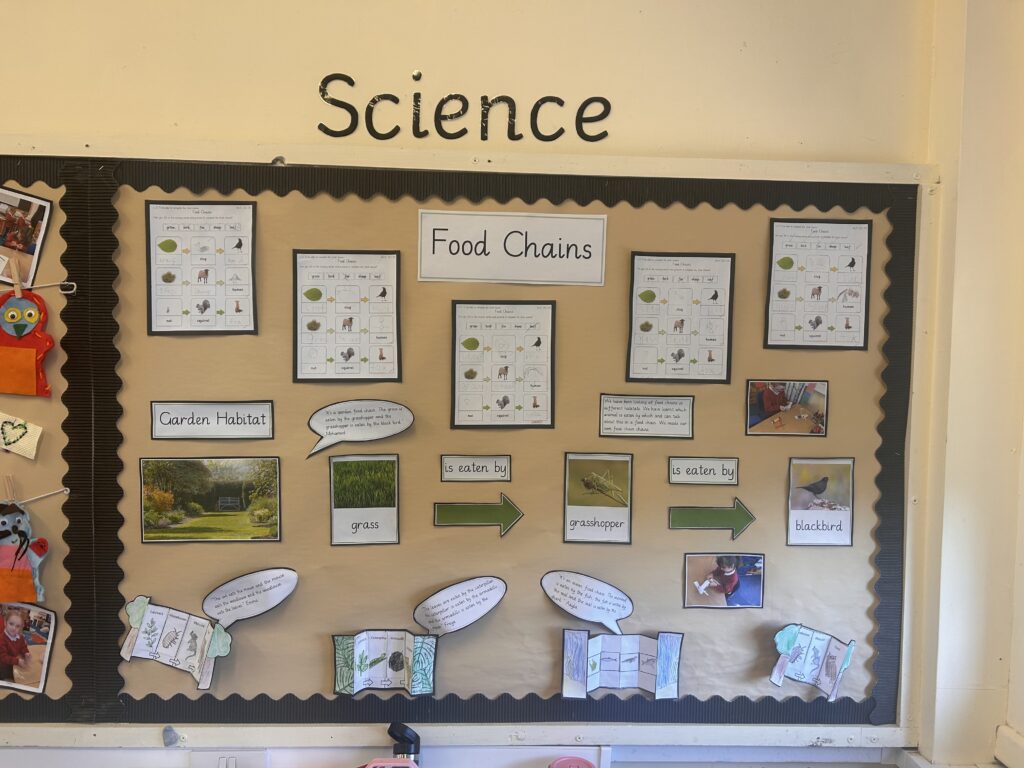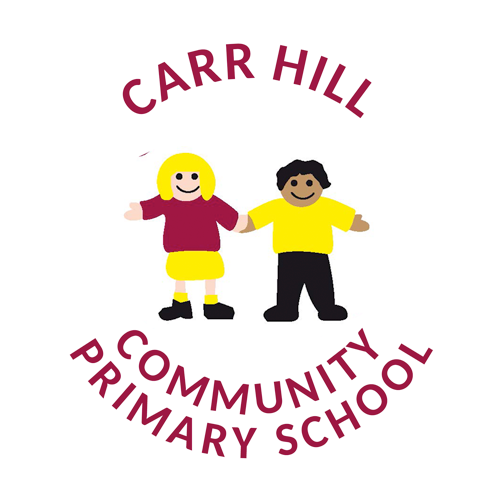Mrs Morris leads the teaching of Science in School
Our Intent for Science
Science teaching at Carr Hill Community Primary School aims to develop children’s interest and enjoyment of science by building on their curiosity.
We aim to give all children a strong understanding of the world around them whilst acquiring specific skills and knowledge to help them to think scientifically, to gain an understanding of scientific processes and concepts as well as an understanding of the uses and implications of science, today and for the future.
At Carr Hill, scientific enquiry skills are embedded in the topics the children study and these topics are revisited and developed throughout their time at school. Children will be encouraged to ask scientific questions and make their own discoveries. All children are encouraged to develop and use a range of skills including observation, planning and investigation, as well as being encouraged to question the world around them and become independent learners in exploring possible answers for their scientific based questions. Specialist vocabulary for topics is taught and built up as they progress through our school.

Our Implementation for Science
Our science curriculum is based on a progressive curriculum which links to the National Curriculum. It is linked where possible to our topics to provide a creative scheme of work, which reflects a balanced programme of study.
- Children are taught to understand and use correct scientific vocabulary based on the objectives and skills being taught. This is built upon as children move through our school.
- Through our planning, we involve problem solving opportunities that allow children to find out for themselves. Children are encouraged to ask their own questions and be given opportunities to use their scientific skills and research to discover the answers, offering a practical ‘hands on’ approach to the teaching and learning of science.
- Teachers create engaging lessons, involving high-quality resources to aid understanding of conceptual knowledge and scientific enquiry.
- Teachers use precise questioning in class to assess conceptual knowledge and skills.
- We build upon the learning and skill development of the previous years. As the children’s knowledge and understanding increases, and they become more proficient in selecting, using scientific equipment, collating and interpreting results, they become increasingly confident in their growing ability to come to conclusions based on their investigations and observations.
- Working scientifically skills are embedded into lessons to ensure these skills are being developed throughout our school.
- Teachers find opportunities to develop children’s understanding of their surroundings by accessing outdoor learning and workshops with experts and participate in science focused events.
Our Implementation for Science
Our science curriculum is based on a progressive curriculum which links to the National Curriculum. It is linked where possible to our topics to provide a creative scheme of work, which reflects a balanced programme of study.
- Children are taught to understand and use correct scientific vocabulary based on the objectives and skills being taught. This is built upon as children move through our school.
- Through our planning, we involve problem solving opportunities that allow children to find out for themselves. Children are encouraged to ask their own questions and be given opportunities to use their scientific skills and research to discover the answers, offering a practical ‘hands on’ approach to the teaching and learning of science.
- Teachers create engaging lessons, involving high-quality resources to aid understanding of conceptual knowledge and scientific enquiry.
- Teachers use precise questioning in class to assess conceptual knowledge and skills.
- We build upon the learning and skill development of the previous years. As the children’s knowledge and understanding increases, and they become more proficient in selecting, using scientific equipment, collating and interpreting results, they become increasingly confident in their growing ability to come to conclusions based on their investigations and observations.
- Working scientifically skills are embedded into lessons to ensure these skills are being developed throughout our school.
- Teachers find opportunities to develop children’s understanding of their surroundings by accessing outdoor learning and workshops with experts and participate in science focused events.
The Impact of Science
Science teaching and learning at Carr Hill results in a fun, engaging, high-quality science education where:
- Children enjoy and are enthusiastic about science in our school.
- Children are motivated learners with sound scientific understanding and scientific enquiry skills.
- Children have a wide variety of skills linked to both scientific knowledge and understanding, and scientific enquiry/investigative skills.
- Children have a richer vocabulary which enables them to articulate their understanding of taught scientific concepts.
Purpose of study
A high-quality science education provides the foundations for understanding the world through the specific disciplines of biology, chemistry and physics. Science has changed our lives and is vital to the world’s future prosperity, and all pupils should be taught essential aspects of the knowledge, methods, processes and uses of science. Through building up a body of key foundational knowledge and concepts, pupils should be encouraged to recognise the power of rational explanation and develop a sense of excitement and curiosity about natural phenomena. They should be encouraged to understand how science can be used to explain what is occurring, predict how things will behave, and analyse causes.
Aims
The national curriculum for science aims to ensure that all pupils:
- develop scientific knowledge and conceptual understanding through the specific disciplines of biology, chemistry and physics
- develop understanding of the nature, processes and methods of science through different types of science enquiries that help them to answer scientific questions about the world around them
- are equipped with the scientific knowledge required to understand the uses and implications of science, today and for the future
Scientific knowledge and conceptual understanding
The programmes of study describe a sequence of knowledge and concepts. While it is important that pupils make progress, it is also vitally important that they develop secure understanding of each key block of knowledge and concepts in order to progress to the next stage. Insecure, superficial understanding will not allow genuine progression: pupils may struggle at key points of transition (such as between primary and secondary school), build up serious misconceptions, and/or have significant difficulties in understanding higher-order content.
Pupils should be able to describe associated processes and key characteristics in common language, but they should also be familiar with, and use, technical terminology accurately and precisely. They should build up an extended specialist vocabulary. They should also apply their mathematical knowledge to their understanding of science, including collecting, presenting and analysing data. The social and economic implications of science are important but, generally, they are taught most appropriately within the wider school curriculum: teachers will wish to use different contexts to maximise their pupils’ engagement with and motivation to study science.
The nature, processes and methods of science
‘Working scientifically’ specifies the understanding of the nature, processes and methods of science for each year group. It should not be taught as a separate strand. The notes and guidance give examples of how ‘working scientifically’ might be embedded within the content of biology, chemistry and physics, focusing on the key features of scientific enquiry, so that pupils learn to use a variety of approaches to answer relevant scientific questions. These types of scientific enquiry should include: observing over time; pattern seeking; identifying, classifying and grouping; comparative and fair testing (controlled investigations); and researching using secondary sources. Pupils should seek answers to questions through collecting, analysing and presenting data. ‘Working scientifically’ will be developed further at key stages 3 and 4, once pupils have built up sufficient understanding of science to engage meaningfully in more sophisticated discussion of experimental design and control.
Spoken language
The national curriculum for science reflects the importance of spoken language in pupils’ development across the whole curriculum – cognitively, socially and linguistically. The quality and variety of language that pupils hear and speak are key factors in developing their scientific vocabulary and articulating scientific concepts clearly and precisely. They must be assisted in making their thinking clear, both to themselves and others, and teachers should ensure that pupils build secure foundations by using discussion to probe and remedy their misconceptions.
School curriculum
The programmes of study for science are set out year-by-year for key stages 1 and 2. Schools are, however, only required to teach the relevant programme of study by the end of the key stage. Within each key stage, schools therefore have the flexibility to introduce content earlier or later than set out in the programme of study. In addition, schools can introduce key stage content during an earlier key stage if appropriate. All schools are also required to set out their school curriculum for science on a year-by-year basis and make this information available online.
Progression Steps
Science Mapping
Reception
Key Stage One
Lower Key Stage Two
Upper Key Stage Two
Science Discipline Symbols

